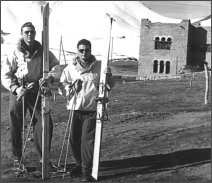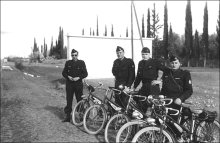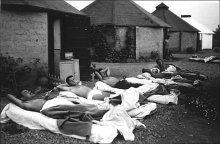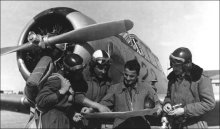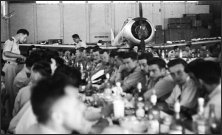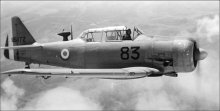|
My years as a pilot
1-Learning to fly
Marrakech
On November 23rd, 1952, we took the train to Bordeaux and boarded a plane to
Casablanca. The final leg was done by train to Marrakech. Upon our arrival, we were told that there was too many
trainees already waiting and we were included in that pool. The recruiting office must have not been well planned
and the excess personnel meant that there was going to be delays in class creation. Each classes consisted of 50
students and started every two months. The training school was closed in July-August, as the heat became unbearable
for the airplanes mainly. We were housed in round huts nicknamed Noualas. Comfort was sparse. With the spring heat,
air conditioning would have been welcomed. Unfortunately it was not available. At night we took our beds outside
to enjoy a bit of relative cooler temperature. The few trainees not commissioned yet had to go through basic training
while the others were used in their areas of expertise. My accounting background had been spotted!!
At that time, we were allowed a certain freedom, at least for the non-com. We were a good team and made the most
of it. We got a hold of mopeds or motorcycles and started discovering the surroundings. We spent a weekend camping
in the Ourika valley with just blankets. We went into town often. We discovered the Djema-El-Fna plaza and the
Medina, the famous Mamounia where our first visit had us worried but ended up with a good time. There was also
the wonderful Menara gardens and other plantations. I also had the opportunity to try downhill sky around Easter
in Oukaimeden, one of the peaks of the Atlas chain near Marrakech. This was my first time skiing and it took many
years before I tried it again....
Our group waited five months before being incorporated in the 53/D class (fourth class of 1953). Training started
with theoretical classes. Various subjects were covered. Physics aerodynamics, meteorology, flight rules and regulation.
The first phase took place in May-June 1953, just before the annual closing.
Flight training started in September. We discovered the T-6 Texan. Famous WWII trainer. The first flights were
exhilarating of course but stressful as well. Although the machine was fifteen years old, it was none-the-less
more modern than the Stampe we flew in Mitry. It was closer to a WWII fighter plane and was actually to be used
in combat during the Algerian conflict. It had a retractable landing gear, a solid engine and could be armed with
guns and rockets.
After 25 hours, the first phase of flight training was sanctioned by a solo flight. Without being a champion, I
pass within the allotted time. We are two students for one instructor but with the personnel rotation our instructors
have a tendency to change often. Most are young NCOs that just had jet fighter training in the US and go back to
the T-6 they started with instead of going to active units equipped with the latest jets. Although I outrank most
of them, I must obey my instructor. Overall they are nice even if some are particular. I had one for some time
but everything went well afterall. The base has four squadrons in addition to the DMP (instructor training division).
Each squadron received the same class for the 10 months of the training. Ours, the MK-53/D, is the 4th squadron
lead by Captain Quercy. We are split in two groups. One flies in the morning while the other flies in the afternoon.
The non-flying group spends its half-day in the classroom or in the flight simulator. Referred to as the link trainer,
this thing has nothing in common with today's simulators. You're in complete darkness. Only the instruments are
lit. The cockpit oscillates in two axes only and you always come out dizzy!. The half-day becomes a drag but you
can't let yourself go as these classes are sanctioned by multiple tests that are as important as the one passed
with the aircraft for the final grade. With five squadrons flying day and night, Marrakech is quickly saturated.
So we use a secondary airfield by the name Sidi-Zouine. Each morning, an antique JU-52 "la julie" transports
fifteen trainees to this field while the same number of trainees would fly our T-6s. We practiced take-off and
landings there. "La Julie" would take home the group that flew the way in while the other half would
take the T-6s home. The afternoon group was doing the same.
Traditionally, each class celebrates the different landmarks of the training. The first celebration takes place
after our first solo flight. Others took place along the way. The last and certainly not the least was for graduation.
This big party would start in the morning with the squadron. We had drinks and group pictures of the trainees with
their instructors by a T-6. Then tables were set in a hangar and drinks were served. We sang and acted small plays.
Afterwards, we headed for the mess were the party continued well into the afternoon. The final party sanctioning
the official graduation was a dinner in town thrown by the students for their instructors and officers.
Specialty training follows basic training. Fighter training took place in Meknes (Morocco) while transport training
takes place in Avord (Cher). Appointment depends on several criteria. First of all, physical ability. In my case,
it was a given since I wasn't cleared for fighters. Then flying ability comes second and finally personal choice
depending on availability when your turn to choose came. Overall, everybody got what they wanted and comes out
happy. We are now at the end of June 1954 and we board a plane from Casablanca to Bordeaux. After a short leave
we have to report to Avord on July 9th. I use my leave to pickup my motorcycle at home and bring it to Avord.
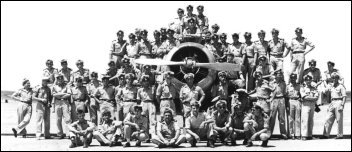
Photo taken at the end of training of class MRK-53D
(I'm first on left)

|
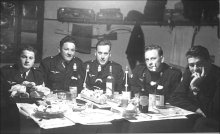
Christmas eve meal 1952… It would be copiously celebrated, I think! Note the contrast between
the austere background and the well garnished table ( from L to R: me, Faubert, Malfroid, Belotti and Tranier)
|


